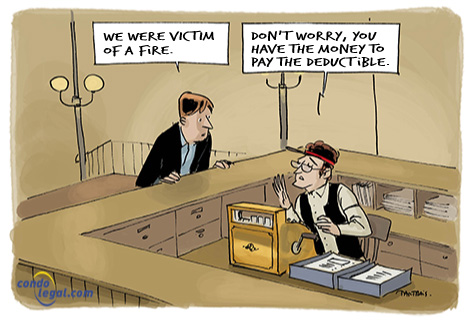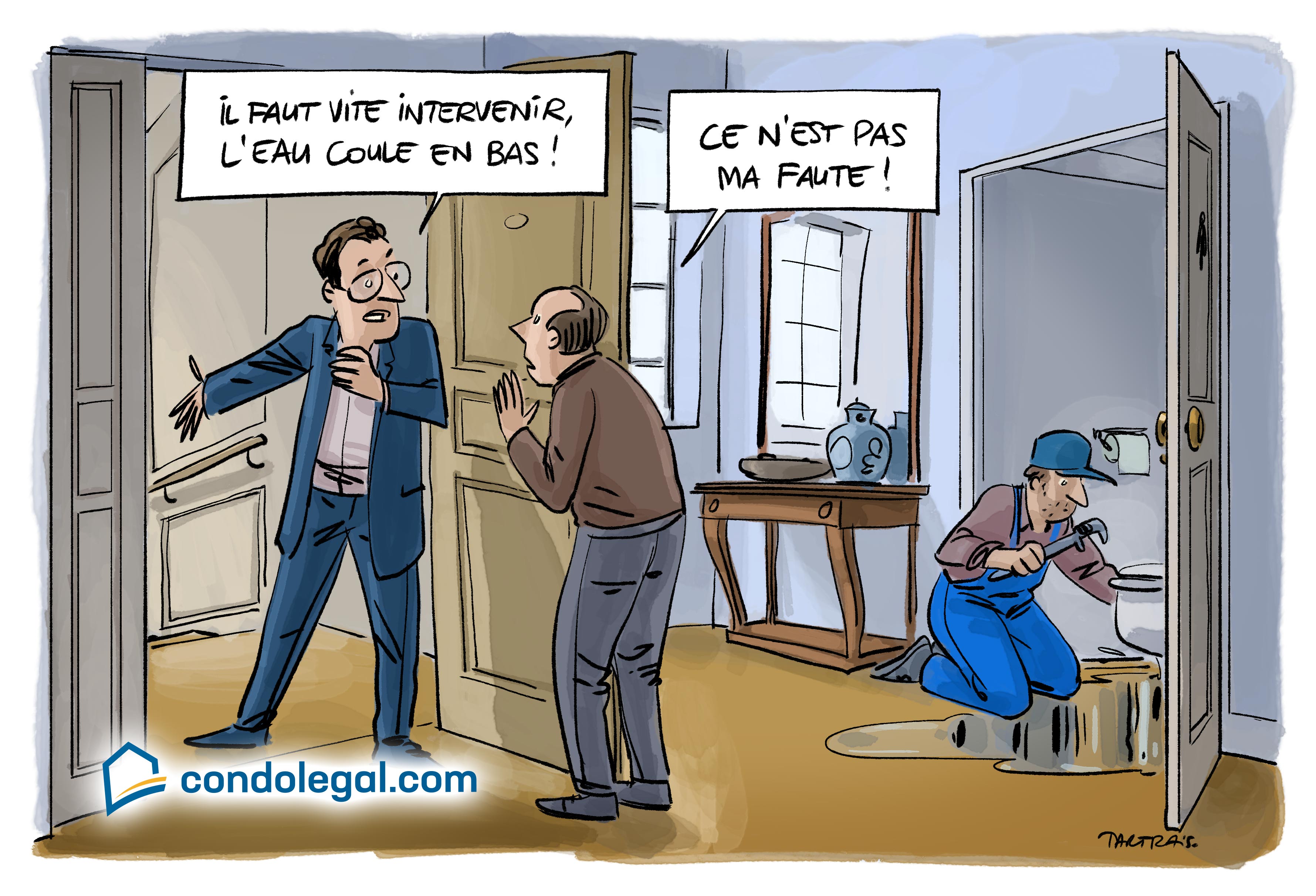Insurance deductible

Most insurance policies include deductibles, with amounts varying based on the insured risk. For example, the deductible for water damage is generally higher than that for fires. The purpose of the deductible is to make the insured responsible by having them cover part of the repair costs for damages caused by the incident. For the syndicate, the advantage lies in reduced premiums, while also encouraging the prevention of incidents. For a community of co-owners, this deductible affects building insurance and the syndicate's liability insurance, as well as the insurance of directors, meeting officers, and the co-ownership manager.
Regarding the co-owner's insurance, each home insurance policy generally includes one or more deductibles that vary depending on the nature of the incident.
What is an insurance deductible?
It is an amount deducted from the indemnity paid out by the insurer. It must be supported by the insured after the occurrence of loss. This amount, stated in the insurance policy, is established by the insurer as it sees fit. The deductible can take various forms: either the insurer intervenes only beyond the deductible threshold, or the amount of the deductible is deducted from the indemnities paid. Insofar as building damage is concerned, the insured (the syndicate of co-owners), must assume a portion of the cost of the repairs, either, from its operating fund, the self-insurance fund, the contingency fund (for certain type of work) or by the means of a special assessment.
Benefit and disadvantages
The amount of the deductible directly affects that of the premium. A high deductible reduces the premium. However, in the event of a claim, the insured will support the amounts that are not be covered. However deductibles generally have a positive effect:
- They compel the insured to be more responsible by taking precautions to limit claims;
- They reduce the amounts to be paid by the insurer respecting indemnities and file management fees (e.g. claims adjuster's fees).
However, the amount of the deductible should not be excessive. Yet, the constant increase in the amount of deductibles imposed by insurers to Quebec co-ownerships, is increasingly becoming a concern. These increases mainly affect damage insurance. The adverse reaction of the insurers results from recurrent losses in divided co-ownership, more particularly those resulting from water damage (e.g. broken pipes or leaking water tanks, overflows and infiltration). Many syndicates have seen their insurer impose deductibles in the tens or even hundreds of thousands of dollars which can jeopardize the financial soundness of a co-ownership and of its co-owners. In Ontario, case law has held that an excessive deductible is tantamount to a default of the syndicate to abide to its obligations. To counter this phenomenon, Ontario has introduced the principle of "reasonable deductibles” in its regulations.
Reasonable deductible
The concept of reasonable deductibles has also been retained by the legislator (in 2018) in the Civil Code of Quebec. The objective is to eliminate unreasonable deductibles stipulated in to many syndicate’s insurance policies. Thus, article 1073 of the Civil Code of Québec has been amended, so that the insurance of the immovable must provide a reasonable deductible. In addition, it should be noted that the government reserved its right to establish, by regulation, the criteria determining the threshold beyond which a deductible is deemed to be unreasonable.
Distribution
The sums incurred by the syndicate for the payment of deductibles are expenses that are distributed among the co-owners, in proportion to the relative value of their fraction (Article 1064 of the Civil Code of Quebec). This method of distribution represents the rule, because the legal provision that prescribes it is of public order of protection. However, the syndicate may seek compensation from a co-owner, if the loss was caused by his fault and, in the cases provided for in the Civil Code of Quebec, by the fact or fault of another person or by the act of things in his custody.
Reducing the frequency of losses
How can one avoid deductible increases? By implementing preventive measures and identifying the risks, such as water damage, and retaining the services of a building professional. The latter will establish a maintenance program that will not only reduce the frequency of claims, but will also limit the increase in the loss ratio of the immovable, so that your insurer should set a reasonable deductible. You could also implement new provisions in your declaration of co-ownership such as to compel each co-owner to replace its hot water tank of more than 10 years of age.
Inappropriate management of losses
Because of high deductible, co-ownership directors may be tempted not to declare a loss to their insurer, assuming the syndicate has no chance of being compensated. However, be aware that sometime your syndicate may, contrary to appearances be entitled to compensation.
It is often difficult to assess accurately the amount of damage caused by a loss. To establish it, it is necessary to carefully and thoroughly evaluate the cost of the repairs. Directors who choose not to declare a loss run the risk of depriving their syndicate of compensation that could have been available, and to engage their personal liability for not doing so.
 WHAT YOU SHOULD KNOW! If a third party is liable for damage suffered by a co-ownership, you can claim from the latter the amount of the deductible and of any damage not reimbursed by your insurer.
WHAT YOU SHOULD KNOW! If a third party is liable for damage suffered by a co-ownership, you can claim from the latter the amount of the deductible and of any damage not reimbursed by your insurer.
 WHAT TO KEEP IN MIND: The amount of the deductible may vary, depending on the number of claims recorded in the syndicate's file. The board of directors has a vested interest to avoid losses in the immovable, because in recent years, insurers no longer hesitate to impose substantial increases to the premiums and deductibles, if a syndicate makes repetitive claims.
WHAT TO KEEP IN MIND: The amount of the deductible may vary, depending on the number of claims recorded in the syndicate's file. The board of directors has a vested interest to avoid losses in the immovable, because in recent years, insurers no longer hesitate to impose substantial increases to the premiums and deductibles, if a syndicate makes repetitive claims.
 WARNING! A high deductible allows for much lower premiums, which can create the illusion of having paid less for insurance coverage. In addition, when the deductible is excessive, it means that the directors may not have fully satisfied their obligation to insure the building for its reconstruction value (replacement value). Again, they could engage their personal liability, because this type of error is usually not covered by their civil liability insurance.
WARNING! A high deductible allows for much lower premiums, which can create the illusion of having paid less for insurance coverage. In addition, when the deductible is excessive, it means that the directors may not have fully satisfied their obligation to insure the building for its reconstruction value (replacement value). Again, they could engage their personal liability, because this type of error is usually not covered by their civil liability insurance.
Back to the factsheets




